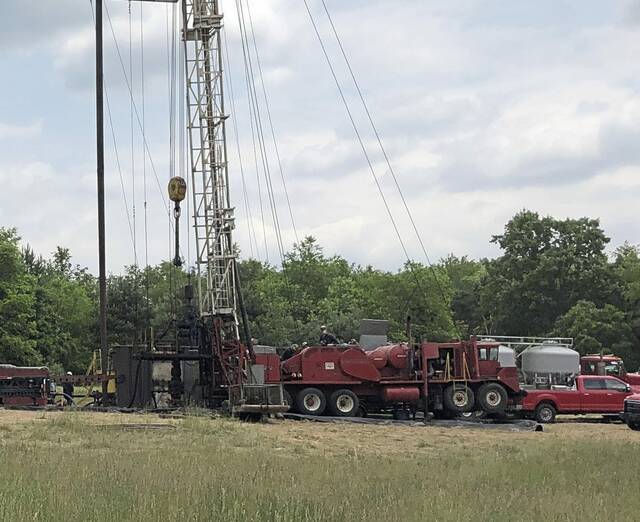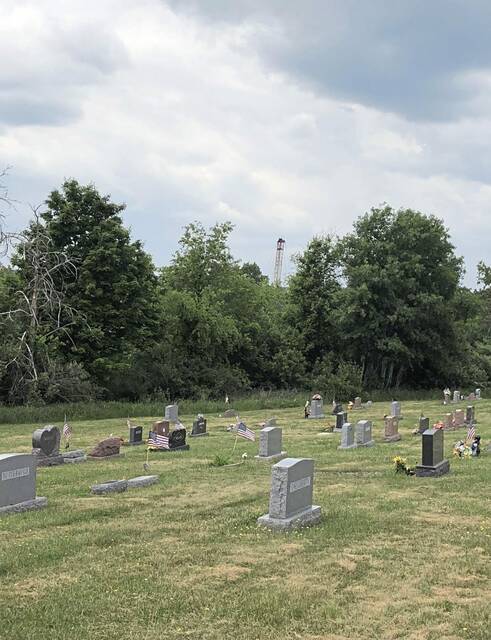Injection rejection: Indiana County community pushes back against fracking residue well
When Judy Wanchisn was a few years into her fight to stop operation of a fracking injection well in her neighborhood, several people asked why she didn’t just move.
“This is our family homestead,” she said, gesturing to the house and small building adjacent to her home on Sebring Road in Grant Township, Indiana County. “It’s one of the first homesteads in East Run.”
As the Wanchisns sit on their back porch, something small and bright red peeks just over the treeline about a mile away. It’s the top of the injection well proposed in 2013 by Warren-based Pennsylvania General Energy.
After a decade of legal battles — some of which are ongoing — Wanchisn and other residents got some welcome news last month: The energy company notified state environmental officials that they intend to plug the well.
“They’re plugging it right now,” Wanchisn’s daughter and township supervisors Chair Stacy Long said of the Yanity well, located along Mill Run Road amidst a small community of less than 700 people.
Part of a May 16 filing in a federal court case involving Grant Township included a notice that PGE intended to plug the well after gas was discovered leaking into the well during a routine inspection.
Plugging work on the well began June 1, according to the state Department of Environmental Protection.
Resource-rich county
Indiana County has a long history of resource extraction in the form of salt, coal, natural gas and timber. But when Long and others heard about PGE’s plan to seek permits for an injection well in 2013, they took action.
“It was just a tiny little legal notice in the paper, about the EPA and this injection well permit,” said Wanchisn, 79. “One of the former township supervisors brought it to me, and I started doing some research.”
Wanchisn didn’t like what she read about the wells, which accept the wastewater, brine and byproducts of unconventional drilling operations, releasing the fluid into porous underground rock formations, according to the EPA.
“My mother started the whole thing,” said Long, who was appointed to the township board of supervisors in 2015 and elected in 2016. “We went to our local League of Women Voters because we wanted to appeal the permits for the well.”
The residents group formed into the state-certified nonprofit East Run Hellbenders Society, and connected with another nonprofit, the Mercersburg-based Community Environmental Legal Defense Fund.
CELDF staff convinced Wanchisn and the society that appealing the permits would not help them oppose the well. As a second-class township, Grant was beholden to the pre-existing laws of the state Township Code.
“That’s kind of the bottom of the pile,” Long said. “When the state tells you to jump, you just jump. So we began working to become a home-rule municipality in order to develop our own laws and not have to rely on the ‘cookie-cutter’ second-class township code.”
After residents approved a ballot measure to institute a community bill of rights that prohibited injection wells, in 2014 PGE filed a lawsuit against them. In 2015, a federal judge invalidated parts of the ordinance because they violated the Second Class Township Code or were ruled unlawfully exclusionary.
Three weeks later, the township’s residents approved a new home-rule charter by a 2-1 margin, changing the township’s form of government and reinstating the ban on injection wells.
“The Home Rule Charter is rights-based. It’s only eight pages long,” Wanchisn said. “It did an end-run around the federal judge’s ruling, and it passed with 60% of the township supporting it.”
Wanchisn said the passage took a lot of phone calls. Her daughter agreed.
“We did a ton of campaigning to make sure people understood it,” Long said. “We’re a very small rural community, and if you’re challenging the state Oil and Gas Act, there’s a very narrow way to do it, basically through zoning — which wasn’t going to help us. Part of the process to do a home-rule charter is a government study commission to look at your situation and your local laws, and that’s what the commission found — being a second-class township was not advantageous for us.”
In 2017, the DEP issued a permit allowing PGE to inject unconventional drilling fluid in Grant. Simultaneously, the DEP also sued the township, claiming its home-rule charter unlawfully interfered with state oil and gas policies. The DEP was successful, and the state’s Commonwealth Court invalidated the charter. The township has appealed that case to the Pennsylvania Supreme Court. The township’s attorneys also filed counter-claims that the DEP was failing to fulfill its duties to protect residents and the environment.
Permit revoked, charter challenged
In March 2020, DEP revoked the Grant well permit, citing the township’s home-rule charter in its grounds for the reversal while simultaneously challenging the charter in court.
Long said she still finds it hard to understand why Pennsylvania’s Environmental Protection Agency sued Grant for trying to protect its environment.
“We can’t believe that they were going to sue us for passing a law to protect us from their inadequacies,” Long said.
Along the way over the past decade, voices from across the oil and gas industry have characterized Grant officials as the pawns of CELDF, unwilling to accept that state and federal law supersede local ordinances.
Industry publication Marcellus Drilling News referred to CELDF as a “radical Big Green group” and headlined a story story about the plugging news, “Bad Guys Win: PA General Energy to Plug Grant Twp Injection Well.”
Proponents of the injection wells have said returning the oil and gas byproducts back into the rock formations where they naturally occurred is much better for the environment than simply treating it and discharging it into rivers, which was once standard practice in Western Pennsylvania.
PGE officials did not return calls for comment. DEP Regional Communications Manager Tom Decker said the department does not comment on pending litigation.
A long fight
Wanchisn said the community effort carries on.
“We couldn’t have done it without CELDF’s help,” she said. “They handle the constitutional things, and our attorney, Donna McClelland, has handled the regulatory side of things.”
And while both Wanchisn and Long were happy to hear about PGE’s notification to plug the injection well, they know this isn’t the end.
Three cases involving larger issues stemming from the situation remain unresolved, according to Chad Nicholson, CELDF community resilience director:
• A federal lawsuit, originally brought by PGE in 2020 against the township over the validity of its home-rule charter. The judge in the case has ordered both sides to file briefs for a tentative mid-July hearing over whether the case is now moot and whether PGE still has standing to pursue it.
• A state lawsuit, which the DEP originally brought in 2017, also over the home-rule charter.
“Their argument is that this is a state issue, and not a local concern,” Nicholson said. “Grant has filed counter-claims, including that the DEP has failed in its mission to protect the environment and residents.”
Nicholson pointed to the Robinson Township v. Commonwealth case, where the state Supreme Court ruled that state regulation allowing industrial uses like injection wells and fracking as a matter of right in any pre-existing zoning district “was incapable of conserving or maintaining the constitutionally-protected aspects of the public environment and of a certain quality of life.”
“Pursuant to the Robinson decision, local communities have the authority and the duty to go beyond the state when it comes to protecting the environment,” Nicholson said.
• There is also a hearing before the state’s Environmental Hearing Board, a DEP appellate board.
“When the DEP rescinded PGE’s permit in early 2020, PGE appealed their decision, and that’s now on hold,” Nicholson said. “The township has intervened in the hearing, and we’re representing them there as well.”
Nicholson said that hearing has been postponed pending resolution of the federal and state cases.
“People shouldn’t have to go through what Grant Township has gone through,” he said. “The default should be that communities have the authority to protect their environment, health, safety and welfare. We’re excited to go to trial and show that these agencies have failed to protect the environment, and communities need more tools to protect what they care about.”
PGE’s notice to the DEP about plugging the well because of a gas leak is a prime example, Nicholson said.
“They didn’t notify the township about any of it,” he said. “It shows that it’s not just these ‘crazy people’ in the township and this ‘crazy group’ that’s defending them. There are problems with this well, and it’s been recorded.”
Long said she simply doesn’t trust the DEP to safeguard residents.
“If there was a contamination situation, sure, the DEP would come in and do its cookie-cutter clean-up,” she said. “But there’s only 700 of us. A bad contamination could poison the whole town.”
Patrick Varine is a TribLive reporter covering Delmont, Export and Murrysville. He is a Western Pennsylvania native and joined the Trib in 2010 after working as a reporter and editor with the former Dover Post Co. in Delaware. He can be reached at pvarine@triblive.com.
Remove the ads from your TribLIVE reading experience but still support the journalists who create the content with TribLIVE Ad-Free.








